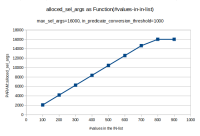Details
-
Bug
-
Status: Closed (View Workflow)
-
Critical
-
Resolution: Not a Bug
-
10.3.22
Description
For query like this:
select * from t where (PK1, PK2, PK3) in ((v1,v2,v3), (v4,v5,v6), ...)
|
with long enough list of tuples for multi-column PK values there are 3 possible plans presented by quotes from ANALYZE FORMAT=JSON outputs):
1. Range scan, can be forced in some cases with FORCE INDEX(PRIMARY):
{
|
"query_block": {
|
"select_id": 1,
|
"r_loops": 1,
|
"r_total_time_ms": 19.184,
|
"table": {
|
"table_name": "t",
|
"access_type": "range",
|
"possible_keys": ["PRIMARY"],
|
"key": "PRIMARY",
|
"key_length": "74",
|
"used_key_parts": [
|
"PK1",
|
"PK2",
|
"PK3"
|
],
|
"r_loops": 1,
|
"rows": 1000,
|
"r_rows": 1000,
|
"r_total_time_ms": 15.165,
|
"filtered": 100,
|
"r_filtered": 100,
|
"attached_condition": "(t.PK1,t.PK2,t.PK3) in (<cache>((349,'*********','01')),<cache>((349,'*********','01')),)"
|
}
|
}
|
}
|
2. For the same IN list in other environment we end up with full table scan that is very slow:
{
|
"query_block": {
|
"select_id": 1,
|
"r_loops": 1,
|
"r_total_time_ms": 51060,
|
"table": {
|
"table_name": "t",
|
"access_type": "ALL",
|
"possible_keys": [
|
"PRIMARY",
|
...
|
],
|
"r_loops": 1,
|
"rows": 7957643,
|
"r_rows": 7.96e6,
|
"r_total_time_ms": 48324,
|
"filtered": 100,
|
"r_filtered": 0.0126,
|
"attached_condition": "(t.PK1,t.PK2,t.PK3) in (<cache>((***,'*******','01')),<cache>((***,'*******','01')),.......)"
|
}
|
}
|
}
|
3. Finally in other environment with very similar data for the same IN list we end up with semijoin optimization applied:
{
|
"query_block": {
|
"select_id": 1,
|
"r_loops": 1,
|
"r_total_time_ms": 11.565,
|
"duplicates_removal": {
|
"table": {
|
"table_name": "<derived3>",
|
"access_type": "ALL",
|
"r_loops": 1,
|
"rows": 1000,
|
"r_rows": 1000,
|
"r_total_time_ms": 0.1065,
|
"filtered": 100,
|
"r_filtered": 100,
|
"materialized": {
|
"query_block": {
|
"union_result": {
|
"table_name": "<unit3>",
|
"access_type": "ALL",
|
"r_loops": 0,
|
"r_rows": null,
|
"query_specifications": [
|
{
|
"query_block": {
|
"select_id": 3,
|
"table": {
|
"message": "No tables used"
|
}
|
}
|
}
|
]
|
}
|
}
|
}
|
},
|
"table": {
|
"table_name": "t",
|
"access_type": "eq_ref",
|
"possible_keys": [
|
"PRIMARY",
|
...
|
],
|
"key": "PRIMARY",
|
"key_length": "74",
|
"used_key_parts": [
|
"PK1",
|
"PK2",
|
"PK3"
|
],
|
"ref": ["tvc_0._col_1", "func", "func"],
|
"r_loops": 1000,
|
"rows": 1,
|
"r_rows": 0.998,
|
"r_total_time_ms": 7.7333,
|
"filtered": 100,
|
"r_filtered": 100,
|
"attached_condition": "t.PK2 = convert(tvc_0._col_2 using utf8) and t.PK3 = convert(tvc_0._col_3 using utf8)"
|
}
|
}
|
}
|
}
|
This plan is the fastest even comparing to range join, but there is no way to force it.
So, I think there is a bug when semijoin optimization is not used even when "range" is extended to full table scan as an alternative. I'd also like to have a way to force the best plan.
Attachments
Issue Links
- relates to
-
MDEV-20900 IN predicate to IN subquery conversion causes performance regression
-
- Closed
-
-
MDEV-21265 IN predicate conversion to IN subquery should be allowed for a broader set of datatype comparison
-
- Closed
-
